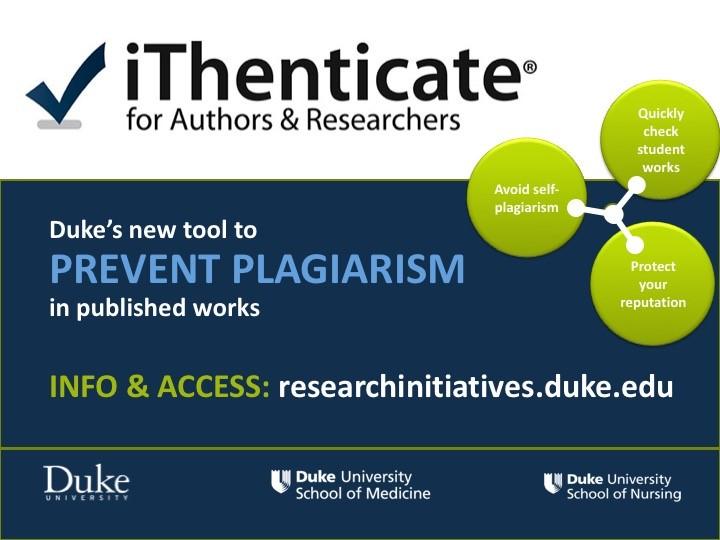
Introduction
A complaint of plagiarism, defined as the use of other people’s ideas, results, or words without proper acknowledgement, can lead to a research misconduct investigation, potential loss of funding, article retraction, and sanctions. Self-plagiarism, re-using one’s own text with the intent of publishing old content as if it were new, original work without proper citation of the original source, is not research misconduct, but is an inappropriate practice. Journal editors often scan manuscripts for plagiarism, and may retract a published paper or reconsider manuscript acceptance if plagiarism or self-plagiarism is detected.
Wiley, Elsevier, and Nature Publishing Group have subscriptions to iThenticate, a plagiarism detection system and several of Elsevier’s journals run all received submissions through a plagiarism detection system. Similarly, federal funding agencies are also carrying out periodic scans of incoming grant proposals for plagiarism. In 2012, the National Science Foundation (NSF) scanned all NSF grants funded in 2011 for plagiarism and found that up to 1.5% of the ~8000 awards required further investigation.
Duke University has chosen iThenticate as the anti-plagiarism tool for the Duke research community to enable early detection of possible plagiarism before works are disseminated. Using iThenticate can serve as both a teaching tool and a preventative measure to help ensure research manuscripts, grant applications, and scholarly documents have the appropriate citations and references of previously published work before submission to journals, funding agencies, and academic repositories.
iThenticate Process
The process for using iThenticate is simple and relatively fast, taking only about 5-15 min to scan each document. First, iThenticate users upload a document into their private cloud-based iThenticate accounts. Then, iThenticate compares all text in that document to the text from an extensive and continually updated library of published materials and websites. Finally, iThenticate generates an interactive report to highlight the text from the user’s document that match text from outside published texts. This report can be exported and provides an overall similarity score, the percentage of the user’s document that matches text from the library of published materials. Once iThenicate creates the report, the user can evaluate whether any matching similarities found in the text will require further discussion and re-writing.
Duke iThenticate Licenses
Duke University, including all University Schools, the School of Medicine, and School of Nursing, purchased iThenticate licenses for all of their faculty engaged in research; and a limited number of licenses are also available for staff upon request. The Duke-iThenticate license agreement requires that licenses be registered to specific Duke persons before an individual can access iThenticate online. To access your account, go to the Duke iThenticate home-page. School of Medicine faculty who cannot access their iThenticate accounts or staff who want to obtain an iThenticate license should contact asistoffice@duke.edu for more information. Faculty and staff from other Duke Schools should contact researchinitiatives@duke.edu for more information about acquiring an iThenticate license.
Resources
For additional guidance on how to use the iThenticate software at Duke, visit the Duke Office of Research Initiatives and download the “iThenticate Quick Start Guide.”
For general writing advice and guidelines on plagiarism, visit Miguel Roig’s guide to Avoiding Plagiarism, Self-plagiarism, and Other Questionable Writing Practices on the ORI’s website.
References
- Reich ES. US authorities crack down on plagiarism. Nature News 2012.
- Plagiarism Detection. https://www.elsevier.com/editors/perk/plagiarism-complaints/plagiarism-detection. Accessed on August 7, 2018.
- Mervis J. NSF Audit of Successful Proposals Finds Numerous Cases of Alleged Plagiarism. Science 2013.